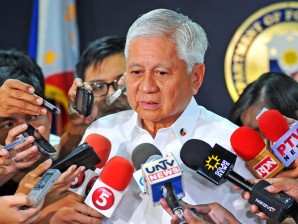DFA’s Del Rosario grilled over Edca
MANILA, Philippines–A solon grilled the Department of Foreign Affairs (DFA) on the Enhanced Defense Cooperation Agreement (Edca) exempting American soldiers from paying taxes while they are in the country, but a Cabinet official said this is standard practice in mutual defense pacts.
During the DFA’s budget deliberations in the House of Representatives on Monday, Bayan Muna Representative Neri Colmenares cited Article 7, Paragraph 1 which stated that the Philippines grants the US “the use of water, electricity, and other public utilities… less the charges for taxes and similar taxes, which will be for the account of the Philippine government.”
“This means US soldiers are not required to pay basic taxes like Value-Added Tax (VAT) as ordinary Filipinos do,” Colmenares said in Filipino.
Foreign Affairs Secretary Albert Del Rosario, who was present during the hearing, said exempting US soldiers from taxes is a standard practice in mutual defense pacts.
“Because of the mutuality of benefits, this is a common practice under international law,” Del Rosario said.
The Cabinet official also begged off from elaborating as the agreement, which seeks to implement the Mutual Defense Treaty and the Visiting Forces Agreement, is pending due to petitions before the Supreme Court.
“One of the assumptions is mutuality of benefits… We have similar arrangements with other countries,” Del Rosario said, noting that while the Philippines exempts US forces from taxes, American soldiers train Philippine soldiers in large-scale training exercises.
Colmenares said the agreement “foregoes such an income from the US [which] really needed bases here.”
Del Rosario maintained that it is for “mutuality of security.”
Below are the important provisions of the agreement:
It gives the United States access to “agreed locations,” mostly Philippine military facilities, for security cooperation exercises, joint training, etc. US forces may also use these locations for bunkering of vessels, refueling of aircraft, temporary accommodation of personnel, prepositioning of equipment and supplies, etc.The locations will be used by US forces without rental or similar costs. However, payment for the use of water, electricity and other public utilities will be shared “pro rata.”US will be allowed “operational control” of agreed locations. They may also make “alterations and improvements” to the facilities. US forces and US contractors “shall have unimpeded access to agreed locations” for the storage of defense equipment, supplies and prepositioned materiel.The Philippines will retain ownership of the locations. However, the US may use permanent buildings it has constructed until it is no longer required by its forces. The parties will agree on the terms of return of any of the agreed locations, including “possible compensation for improvements or construction.”
Resolution of disputes on the Edca shall be resolved between the two countries. It “shall not be referred to any national or international court, tribunal, or other similar body, or to any third party for settlement, unless otherwise agreed by the Parties.”
RELATED STORIES
Militants, gov’t workers join SC fight vs Edca
Edca undermines PH independence—Bayan















